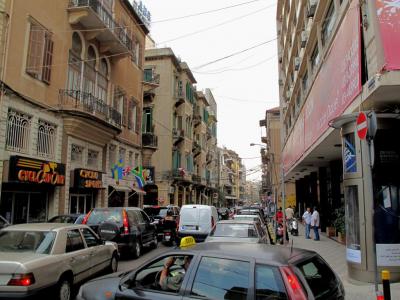
Rue Gouraud (Gouraud Street), Beirut
The Gouraud Street, once called "Soho by the Sea", was named for French General Henri Gouraud, who had established the French Mandate of Syria and the State of Lebanon. It is a commercial and residential street in the trendy bohemian area of Beirut called Gemmayzeh. The district has narrow streets and buildings from the French era.
The Gemmayzeh neighborhood has more than its share of fashionable bars, cafes, lounges, and restaurants and most of these can be found on the Gouraud Street. The street is east of the city's Central District and north of the upscale, high-maintenance Saifi Village (Summer Village). It extends from Avenue Haddad to the promenade of the Corniche de Fleuve (Corniche River).
The sobriquet "Soho by the Sea" was awarded by Travel and Leisure magazine in 2004. The title fits it perfectly. It is colorful and chic, and it has very fifties style tenements. Next to the street are the Saint Nicholas Stairs, aka "Escalier de l'Art"(Stairway Art). The Stairs are the venue for art festivals each year. They also lead to Monnot street, named after French Jesuit Father Ambroise Monnot, and the Summer Village.
Spoiler alert. Both street Gouraud and the Gemmayzeh district suffered heavy damages in the horrible 2020 explosion. They will come back better than before.
The Gemmayzeh neighborhood has more than its share of fashionable bars, cafes, lounges, and restaurants and most of these can be found on the Gouraud Street. The street is east of the city's Central District and north of the upscale, high-maintenance Saifi Village (Summer Village). It extends from Avenue Haddad to the promenade of the Corniche de Fleuve (Corniche River).
The sobriquet "Soho by the Sea" was awarded by Travel and Leisure magazine in 2004. The title fits it perfectly. It is colorful and chic, and it has very fifties style tenements. Next to the street are the Saint Nicholas Stairs, aka "Escalier de l'Art"(Stairway Art). The Stairs are the venue for art festivals each year. They also lead to Monnot street, named after French Jesuit Father Ambroise Monnot, and the Summer Village.
Spoiler alert. Both street Gouraud and the Gemmayzeh district suffered heavy damages in the horrible 2020 explosion. They will come back better than before.
Want to visit this sight? Check out these Self-Guided Walking Tours in Beirut. Alternatively, you can download the mobile app "GPSmyCity: Walks in 1K+ Cities" from Apple App Store or Google Play Store. The app turns your mobile device to a personal tour guide and it works offline, so no data plan is needed when traveling abroad.
Rue Gouraud (Gouraud Street) on Map





Sight Name: Rue Gouraud (Gouraud Street)
Sight Location: Beirut, Lebanon (See walking tours in Beirut)
Sight Type: Attraction/Landmark
Guide(s) Containing This Sight:
Sight Location: Beirut, Lebanon (See walking tours in Beirut)
Sight Type: Attraction/Landmark
Guide(s) Containing This Sight:
Walking Tours in Beirut, Lebanon
Create Your Own Walk in Beirut
Creating your own self-guided walk in Beirut is easy and fun. Choose the city attractions that you want to see and a walk route map will be created just for you. You can even set your hotel as the start point of the walk.
Beirut Introduction Walking Tour
How many times can a city die? Beirut, in 5,000 years, has died and come back many times. Archeological digs downtown have revealed Phoenician, Greek, Roman, Byzantine, Arab, Crusader and Ottoman remains and signs of influence.
In 140 BC the city was destroyed by Diodotus Tryphon, a king of the Seleucid Empire. His Hellenistic city lies over the Phoenician one. Pompey the Great arrived in 64 BC... view more
Tour Duration: 2 Hour(s)
Travel Distance: 3.3 Km or 2.1 Miles
In 140 BC the city was destroyed by Diodotus Tryphon, a king of the Seleucid Empire. His Hellenistic city lies over the Phoenician one. Pompey the Great arrived in 64 BC... view more
Tour Duration: 2 Hour(s)
Travel Distance: 3.3 Km or 2.1 Miles
Seaside Walking Tour
If you wish to unwind or, perhaps, seek some quality time with your family and friends in a completely safe environment, while in Beirut, the local seaside area offers ample opportunities for both. Lined with palm trees, the city's waterfront guarantees a truly joyful experience and is as much fun for watching the Mediterranean, beautiful people and breathing the air as it is for exploring... view more
Tour Duration: 2 Hour(s)
Travel Distance: 3.2 Km or 2 Miles
Tour Duration: 2 Hour(s)
Travel Distance: 3.2 Km or 2 Miles


